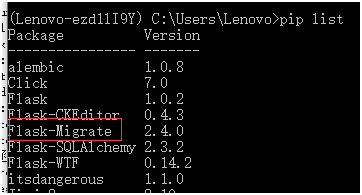flask 使用Flask-Migrate迁移数据库(创建迁移环境、生成迁移脚本、更新数据库) --
使用Flask-Migrate迁移数据库
在开发时,以删除表再重建的方式更新数据库简单直接,但明显的缺陷是会丢掉数据库中的所有数据。在生产环境下,没有人想把数据都删除掉,这时需要使用数据库迁移工具来完成这个工作。SQLAlchemy的开发者Michael Bayer写了一个数据库迁移工作—Alembic来帮助我们实现数据库的迁移,数据库迁移工具可以在不破坏数据的情况下更新数据库表的结构。蒸馏器(Alembic)是炼金术士最重要的工具,要学习SQL炼金术(SQLAlchemy),当然要掌握蒸馏器的使用。
扩展Flask-Migrate继承了Alembic,提供了一些flask命令来简化迁移工作,我们将使用它来迁移数据库。Flask-Migrate及其依赖(主要是Alembic)可以使用pipenv安装:
(Lenovo-ezd1lI9Y) C:\Users\Lenovo>pipenv install flask-migrate

在程序中,我们实例化Flask-Migrate提供的Migrate类,进行初始化操作:
from flask import Flask, render_template, flash, url_for, redirect from flask_sqlalchemy import SQLAlchemy from flask_migrate import Migrate app = Flask(__name__) db = SQLAlchemy(app) migrate = Migrate(app, db) # 在db对象创建后调用
实例化Migrate类时,除了传入程序app,还需要传入实例化Flask-SQLAlchemy提供的SQLAlchemy类创建的db对象作为第二个参数。
1、创建迁移环境--flask db init
在开始迁移数据之前,需要先使用下面的命令创建一个迁移环境:
(Lenovo-ezd1lI9Y) D:\flask\FLASK_PRACTICE\DataBase>flask db init Creating directory D:\flask\FLASK_PRACTICE\DataBase\migrations ... done Creating directory D:\flask\FLASK_PRACTICE\DataBase\migrations\versions ... done Generating D:\flask\FLASK_PRACTICE\DataBase\migrations\alembic.ini ... done Generating D:\flask\FLASK_PRACTICE\DataBase\migrations\env.py ... done Generating D:\flask\FLASK_PRACTICE\DataBase\migrations\env.pyc ... done Generating D:\flask\FLASK_PRACTICE\DataBase\migrations\README ... done Generating D:\flask\FLASK_PRACTICE\DataBase\migrations\script.py.mako ... done Please edit configuration/connection/logging settings in 'D:\\flask\\FLASK_PRACTICE\\DataBase\\migrations\\alembic.ini' before proceeding.
Flask-Migrate提供了一个命令集,使用db作为命令集名称,它提供的命令都以flask db开头。你可以在命令行中输入flask—help查看所有可用的命令和说明。
(Lenovo-ezd1lI9Y) D:\flask\FLASK_PRACTICE\DataBase>flask db --help Usage: flask db [OPTIONS] COMMAND [ARGS]... Perform database migrations. Options: --help Show this message and exit. Commands: branches Show current branch points current Display the current revision for each database. downgrade Revert to a previous version edit Edit a revision file heads Show current available heads in the script directory history List changeset scripts in chronological order. init Creates a new migration repository. merge Merge two revisions together, creating a new revision file migrate Autogenerate a new revision file (Alias for 'revision... revision Create a new revision file. show Show the revision denoted by the given symbol. stamp 'stamp' the revision table with the given revision; don't run... upgrade Upgrade to a later version
迁移环境只需要创建一次。这会在你的项目根目录下创建一个migrations文件夹其中包含了自动生成的配置文件和迁移版本文件夹。

2、生成迁移脚本--flask db migrate -m "add note timestamp"
使用migrate子命令可以自动生成迁移脚本:
(Lenovo-ezd1lI9Y) D:\flask\FLASK_PRACTICE\DataBase>flask db migrate -m "add note timestamp" INFO [alembic.runtime.migration] Context impl SQLiteImpl. INFO [alembic.runtime.migration] Will assume non-transactional DDL. INFO [alembic.autogenerate.compare] Detected removed table u'draft' INFO [alembic.autogenerate.compare] Detected removed table u'post' INFO [alembic.autogenerate.compare] Detected removed table u'comment' Generating D:\flask\FLASK_PRACTICE\DataBase\migrations\versions\cdd9d12762fc_add_note_timestamp.py ... done
这条命令可以简单理解为在flask里对数据库(db)进行迁移(migrate)。-m选项用来添加迁移备注信息。从上面的输出信息我们可以看到,Alembic检测出了模型变化:表note新加了一个timestamp列,并且相应生成了一个迁移脚本cdd9d12762fc_add_note_timestamp.py:
"""add note timestamp Revision ID: 7f3dae8cae4d Revises: Create Date: 2019-04-01 21:56:32.469000 """ from alembic import op import sqlalchemy as sa # revision identifiers, used by Alembic. revision = '7f3dae8cae4d' down_revision = None branch_labels = None depends_on = None def upgrade(): # ### commands auto generated by Alembic - please adjust! ### op.drop_table('draft') op.drop_table('post') op.drop_table('comment') op.add_column('note', sa.Column('timeStamp', sa.String(length=70), nullable=True)) op.create_unique_constraint(None, 'note', ['timeStamp']) # ### end Alembic commands ### def downgrade(): # ### commands auto generated by Alembic - please adjust! ### op.drop_constraint(None, 'note', type_='unique') op.drop_column('note', 'timeStamp') op.create_table('comment', sa.Column('id', sa.INTEGER(), nullable=False), sa.Column('body', sa.TEXT(), nullable=True), sa.Column('post_id', sa.INTEGER(), nullable=True), sa.ForeignKeyConstraint(['post_id'], [u'post.id'], ), sa.PrimaryKeyConstraint('id') ) op.create_table('post', sa.Column('id', sa.INTEGER(), nullable=False), sa.Column('title', sa.VARCHAR(length=50), nullable=True), sa.Column('body', sa.TEXT(), nullable=True), sa.PrimaryKeyConstraint('id') ) op.create_table('draft', sa.Column('id', sa.INTEGER(), nullable=False), sa.Column('body', sa.TEXT(), nullable=True), sa.Column('edit_time', sa.INTEGER(), nullable=True), sa.PrimaryKeyConstraint('id') ) # ### end Alembic commands ###
从上面的代码可以看出,迁移脚本主要包含了两个函数:upgrate()函数用来将改动应用到数据库,函数中包含了向表中添加timestamp字段的命令,而downgrade()函数用来撤消改动,包含了删除timestamp字段的命令。
就像这两个函数中的注释所说的,迁移命令是有Alembic自动生成的,其中可能包含错误,所以有必要在生成后检查一下。
因为每一次迁移都会生成新的迁移脚本,而且Alemic为每一次迁移都生成了修订版本(revision)ID,所以数据库可以恢复到修改历史中的任一点。正因如此,迁移环境中的文件也要纳入版本控制。
有些复杂的错误无法实现自动迁移,这时可以使用revision命令手动创建迁移脚本。这同样会生成一个迁移脚本,不过脚本中的upgrade()和downgrade()函数都是空的。你需要使用Alembic提供的Operations对象指令在这两个函数中实现具体操作,具体可以访问Alembic官方文档查看。
3、更新数据库--flask db upgrade
生成了迁移脚本后,使用upgrade子命令即可更新数据库:
(Lenovo-ezd1lI9Y) D:\flask\FLASK_PRACTICE\DataBase>flask db upgrade INFO [alembic.runtime.migration] Context impl SQLiteImpl. INFO [alembic.runtime.migration] Will assume non-transactional DDL. INFO [alembic.runtime.migration] Running upgrade -> 7f3dae8cae4d, add note timestamp ERROR [root] Error: No support for ALTER of constraints in SQLite dialect
如果还没有创建数据库和表,这个命令会自动创建,如果已经创建,则会在不损坏数据的前提下执行更新。
从客户端可以看到note表新增加了一个timestamp字段

如果你想回滚迁移,那么可以使用downgrade命令(降级),它会撤销最后一次迁移在数据库中的改动,这在开发时非常有用。比如,当执行upgrade命令后发现某些地方出错了,这时就可以执行flask db downgrade命令进行回滚,删除对应的迁移脚本,重新生成迁移脚本后再进行更新(upgrade)。
SQLite迁移问题:flask db downgrade 报错
(Lenovo-ezd1lI9Y) D:\flask\FLASK_PRACTICE\DataBase>flask db downgrade 5e87b4da6187 INFO [alembic.runtime.migration] Context impl SQLiteImpl. INFO [alembic.runtime.migration] Will assume non-transactional DDL. ERROR [root] Error: Destination 5e87b4da6187 is not a valid downgrade target from current head(s)
是因为sqlite不支持alter机制的原因
开发时是否需要迁移?
在生产环境下,当对数据库结构进行修改后,进行数据库迁移是必要的。因为你不想损坏任何数据,在生成自动迁移脚本之后,执行更新之前,对迁移脚本进行检查,甚至是使用备份的数据库进行迁移测试,都是有必要的。
在开发环境中,你可以按需要选择是否进行数据库迁移,对于大多数程序来说,可以在开发时使用虚拟数据生成工具来生成虚拟数据,从而避免手动创建记录进行测试,这样每次更改表结构时,可以直接清楚后重新生成,然后生成测试数据,这要比执行一次迁移简单的多(后续会学到通过一个命令完成所有工作),除非生成虚拟数据耗费的时间过长。
另外,在本地本地开发时通常使用SQLite作为数据库引擎。SQLite不支持ALTER语句,而这正是迁移工具依赖的工作机制,也就是说,当SQLite数据库的字段删除或修改后,我们没法直接使用迁移工具进行更新,你需要手动添加迁移代码进行迁移。在开发中,修改和删除列是很常见的行为,手动操作迁移会花费太多时间。
对于SQLite,迁移工具一般使用”move and copy”的工作流(创建新表、迁移数据、删除旧表)达到类似的效果。
如果希望让生产环境的部署更搞笑,则应该尽可能让开发环境和生产环境保持一致。这时应该考虑直接在本地使用MySQL或其他的DBMS,然后设置迁移环境。



